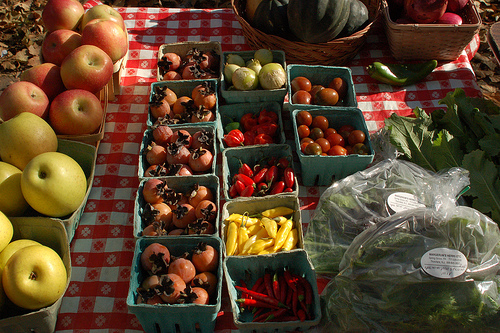
Green Diet
When thinking of healthy foods, do you also think of what is healthy for the planet? What you eat not only affects your well being, but also that of every step of the process involved with bringing food to your plate. Plants and animals, oils and spices it all has to come from somewhere. How does it impact the planet, and are there better alternatives? Luckily, it seems to be that a diet good for the planet is also good for your health. The USDA dietary guidelines not only consider nutrition, but also sustainability. Some have claimed this is beyond the reach the guidelines should have, but it is important to keep the planet in mind as an individual but even more so on a large scale, such as the body setting guidelines for an entire country.
The best diet plan for your body and the Earth is one based on vegetables, with only a small amount of animal products or none at all. For example, the average Spanish diet includes far less red meat than many others. This means a smaller carbon footprint, which can be attributed to less production of greenhouse gases associated with animal farming. The consumption of meat, and especially red meat, is the leading contributor to greenhouse gases across all food causes. Beef and lamb production, as lamb is also a red meat, releases 250 times more greenhouse gases per gram than the farming process of legumes. Sustainably raised and processed meat has less of an impact than industrialized production, and can even bring benefits such as fertilizer.
On average, Americans only get 15% of their protein from plant sources. Increasing that by only ten percent would free up enough water to provide two-thirds of California with their water supply. Shifting meat serving sizes to smaller portions is also beneficial, especially in fast food and other situations where there is no way out of serving meat. Not only does a smaller meat serving mean less water is used in production, it also means less calories and
more financial freedom for the company providing the food to consumers.
If it’s good for the Earth in that less greenhouse gasses are produced, how exactly is eating this way better for you? You could go vegan and eliminate all animal products, but most agree that as long as a majority of your food intake is plant-based, that is good enough and is many times better than animal based. Serious diseases may be prevented, symptoms of existing conditions controlled, and general well being will of course be expanded.
Diabetes is sometimes able to be controlled by diet, and even eliminated in certain cases. Nonetheless, a healthy diet is essential for diabetes of any magnitude. Over 380 million people have diabetes, and it is expected to nearly double by 2035. Type 2 diabetes is actually preventable, and a plant-based diet can be especially helpful. For type 1 that cannot be prevented, it will not hurt to eat better for your own health and for the planet’s. High blood pressure is also very common, with one in three American adults having some form of it. A diet high in plant products is thought to be very beneficial. High blood pressure can lead to serious problems including heart disease. Eating right can prevent what is preventable, but also help with what is already there.
The more fruits and vegetables you eat, the less likely you are to develop cardiovascular disease. Eight or more servings a day can mean a 30% reduction in stroke and heart attack risk. It can be difficult to achieve a high intake, but relying on a plant-based diet will require a higher intake and meals based around plant proteins instead of animal. Fruits and vegetables and other plant products bring an increased fiber content to a diet, meaning additional benefits in numerous areas. Digestion, cholesterol, and blood sugar are all benefitted when fiber intake is increased. Plant-based diets can also benefit vision and prevent cataracts and macular degeneration, with the same compounds and pigments also contributing to healthy skin.
More plant products is a good thing, but less animal products is also a good thing all on its own. High amounts of red meat can impact gut inflammation and the development of diverticulitis. Each daily serving can increase the risk by 18%. Plant-based diets do not mean all animal products or proteins have to be cut out, which means fish and poultry can absolutely be on the table in moderation. Replacing each red meat serving with either alternative decreases risk by 20%. Processed meats may also increase the risk of developing cancer, and a diet based on plants and moderate fish can decrease that risk by 45%.
A reduction in inflammation can mean better prevention and management of a number of diseases and conditions. Cancer, heart disease, depression, arthritis, Alzheimer’s- there’s a lot linked to inflammation. The best anti-inflammatory foods often find themselves in a Mediterranean diet, or a pescaterian way of eating. Mostly plants with some fish means plenty of healthy fats and nutrients. Tomatoes, olive oil, leafy vegetables, nuts, and fruit are components of this diet. Consider them as an essential part of any diet, plant-based or not. Don’t forget that beverages are also part of your diet. Luckily, coffee has been shown to reduce inflammation.
Conclusion:
Eating a healthy diet should be done to maintain a healthy weight as much as you may opt to lose weight. Don’t get confused and think that all plant-based foods are healthy and weight-loss-friendly, but remember that you can still have fun and enjoy yourself without indulging in too many animal products.
If weight loss is the goal, you must continue to eat in a positive fashion even after your goal weight has been achieved.
If you lose weight by eating a plant-based diet and then go back to old habits, you are likely to gain back the lost weight and notice all the ill effects you did not notice before. Even the pills are not a substitute for a good diet consider them a possible help, but never something to rely on. There are so many reasons to eat a plant based diet for yourself and the Earth, and it can start with one less burger or one more serving of vegetables. Small steps can leave a big footprint.
 WhosGreenOnline.com Your Online Magazine and Directory for Green Business, Product, Service and News!
WhosGreenOnline.com Your Online Magazine and Directory for Green Business, Product, Service and News!






One comment
Pingback: Coronavirus and WhosGreenOnline.com | WhosGreenOnline.com